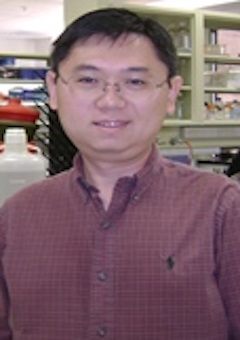
Contact
- Office: (210) 567-3964 | Lab: (210) 567-3957
- xuz3@uthscsa.edu
Department
Microbiology, Immunology & Molecular GeneticsXu, Zhenming, Ph.D.
Associate Professor
Personal Statement:
Dr. Xu’s career goals are to conduct biomedical research that will advance the fundamental understanding of immunology, to translate our knowledge for the development of thereapeutics that benefit patients, and to mentor graduate students and post-doctoral fellows towards a successful career path of their own.
Education
Ph.D., Molecular Microbiology and Immunology at the University of Southern California
Research
Research interests:
Dr. Xu’s research focuses on the mechanisms underlying differentiation and functions of B lymphocytes in antibody responses to infectious pathogens and vaccines. These mechanisms include the nature of innate and adaptive stimuli (as produced by microbes or host cells) that can activate B cells, the modality of signal transduction pathways, and interactions of protein factors, epigenetic marks and DNA cis-elements in regulating the gene expression and targeting of molecular machineries. Importantly, he has characterized the modality of NF-kB activation in B cells by these stimuli and analyzed the NF-kB-dependent induction of activation-induced cytidine deaminase (AID), a genome-editing enzyme that is essential for antibody class-switching and affinity improvement but can also lead to genome-wide DNA damages when dysregulated. Our recent findings have demonstrated that Rab7, a small GTPase that localizes mainly in endosomes, plays a B cell-intrinsic role in NF-kB activation and AID induction for effective antibody responses, likely through assembly of “signalosomes” on intracellular membrane structures to strengthen signals and their specificity.
Dr. Xu also wants to understand how B cell differentiation mechanisms are dysregulated, leading to disease conditions, and aims to explore the therapeutic potential of targeting these mechanisms. For this, his lab uses animal models of autoimmune diseases (e.g., the life-debilitating systemic lupus) and B cell malignancies (e.g., diffused large B cell lymphoma) as well as aging mice. The lab also uses a Rab7-specific small molecule compound to prevent or reverse B cell dysregulation in the context of lupus and B cell lymphomagenesis, and is in the process of developing compound derivatives with further enhanced affinities for their targets and decreased affinity for off-targets. These studies have high clinical relevance and will facilitate the development of new therapeutics.
Keywords: B Lymphocyte activation; Cancer and Vaccination
Awards & Accomplishments
| Year | Award Name |
|---|---|
| 2005-08 | Ruth L. Kirschstein National Research Service Award, National Institutes of Health |
| 2008 | Travel Award, the 95th American Association of Immunologists Annual Meeting |
| 2014 | Travel Grant Award for early career faculty, AAI Immunology 2014 Meeting |
Affiliations
- Associate Editor, Autoimmunity (publisher: Informa Healthcare)
- Guest Editor, “TLRs in autoantibody responses” monographic issue, Autoimmunity
Publications
-
Xu, Z., E. J. Pone, A. Al-Qahtani, S.-R. Park, H. Zan and P. Casali. 2007. Regulation of aicda expression and AID activity: rwelevance to somatic hypermutation and class switch DNA recombination. Crit. Rev. Immunol. 27:367-397. [Free access through PubMed Central: http://www.ncbi.nlm.nih.gov/pmc/articles/PMC2994649/]
- Park, S.-R., H. Zan, Z. Pal, J. Zhang, A. Al-Qahtani, E. J. Pone, Z. Xu, T. Mai and P. Casali. 2009. HoxC4 binds to the promoter of the cytidine deaminase AID gene to induce AID expression, class-switch DNA recombination and somatic hypermutation. Nat. Immunol. 10:540-550. [Free access through PubMed Central: http://www.ncbi.nlm.nih.gov/pmc/articles/PMC2753990/]
- Xu, Z., Z. Fulop, G. Wu, E. J. Pone, J. Zhang, T. Mai, L. M. Thomas, A. Al-Qahtani, C. A. White, S.-R. Park, P. Steinacker, Z. Li, J. R. Yates, III, B. Herron, M. Otto, H. Zan, H. Fu and P. Casali. 2010. 14-3-3 adaptor proteins recruit AID to 5′-AGCT-3′-rich switch regions for class switch recombination. Nat. Struct. Mol. Biol.17:1124-1135. [Free access through PubMed Central: http://www.ncbi.nlm.nih.gov/pmc/articles/PMC3645988/]
- Pone, E. J.*, J. Zhang*, T. Mai, C. A. White, G. Li, J. K. Sakakura, P. J. Patel, A. Al-Qahtani, H. Zan, Z. Xu* and P. Casali. 2012. BCR-signalling synergizes with TLR-signalling for induction of AID and immunoglobulin class-switching through the non-canonical NF-kB pathway. Nat. Commun. 3:767, 1-12 (*equal contributors). [Free access through PubMed Central: http://www.ncbi.nlm.nih.gov/pmc/articles/PMC3337981/]
- Xu, Z., H. Zan, E. J. Pone, T. Mai and P. Casali. 2012. Immunoglobulin class-switch DNA recombination: induction, targeting and beyond. Nat. Rev. Immunol. 12:517-531. [Free access through PubMed Central: http://www.ncbi.nlm.nih.gov/pmc/articles/PMC3545482/]
- Li, G., E. J. Pone, D. C. Tran, P. J. Patel, L. Dao, Z. Xu§ and P. Casali. 2012. Iron inhibits activation-induced cytidine deaminase enzymatic activity and modulates immunoglobulin class switch DNA recombination. J. Biol. Chem.287:21520-21529 (§corresponding author). [Free access through PubMed Central: http://www.ncbi.nlm.nih.gov/pmc/articles/PMC3951903/]
- Mai T., E. J. Pone, G. Li, T. S. Lam, J. Moehlman, Z. Xu§ and P. Casali§. 2013. Induction of activation-induced cytidine deaminase-targeting adaptor 14-3-3g is mediated by NF-kB-dependent recruitment of CFP1 to the 5’-CpG-3’-rich 14-3-3gpromoter and is sustained by E2A. J. Immunol. 191:1895-1906 (§co-corresponding authors). [Free access through PubMed Central: http://www.ncbi.nlm.nih.gov/pmc/articles/PMC3833273/]
- Li, G.*, C. A. White, T. Lam, E. J. Pone, D. C. Tran, K. L. Hayama, H. Zan, Z. Xu* and P. Casali. 2013. Combinatorial H3K9acS10ph histone modifications in IgH locus S regions target 14-3-3 adaptors and AID to specify antibody class switch DNA recombination. Cell Rep. 5:702-714 (*equal contributors). [Free access through PubMed Central: http://www.ncbi.nlm.nih.gov/pmc/articles/PMC3951903/]
- Pone E. J., Z. Lou, T. Lam, M. L. Greenberg, R. Wang, Z. Xu§ and P. Casali§. 2015. B cell TLR1/2, TLR4, TLR7 and TLR9 interact in induction of class switch DNA recombination: modulation by BCR and CD40, and relevance to T-independent antibody responses. Autoimmunity 48: 1-12 (§co-corresponding authors). [PubMed link: http://www.ncbi.nlm.nih.gov/pubmed/25536171]
- Pone E. J., T. Lam, Z. Lou, R. Wang, Y. Chen, D.-F. Liu, A. L. Edinger, Z. Xu§ and P. Casali§. 2015. B cell Rab7 mediates induction of AID expression and class-switching in T-dependent and T-independent antibody responses. J. Immunol. 194: 3065-3078 (§co-senior authors). [PubMed link: http://www.ncbi.nlm.nih.gov/pubmed/25740947]
